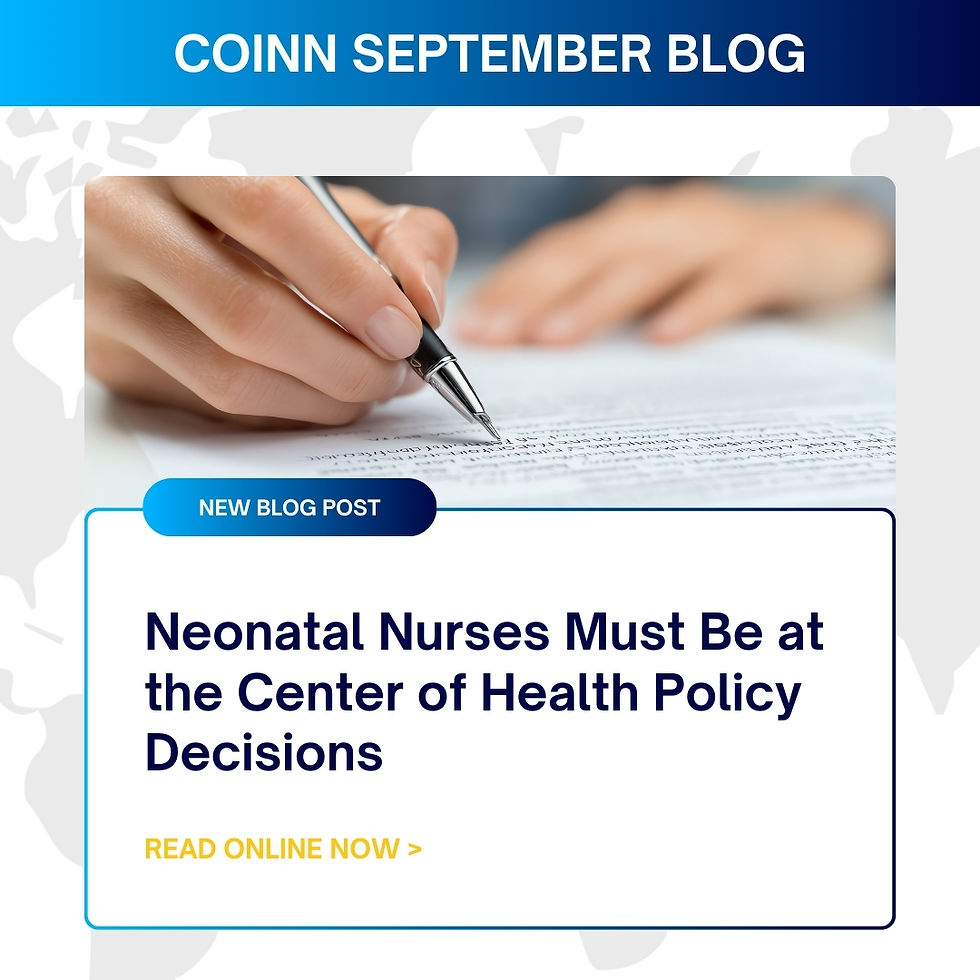Nurses advocating at the local level.
- info214609
- Oct 7, 2023
- 3 min read

Whether it is climate change, a pandemic, war, or famine, the most vulnerable in any society pay the highest price. The morbidity and mortality rates for the most vulnerable far outpace those who have a voice that is listened to and power.
As we face more and more “once in a century” crises, we realize they are more and more commonplace, and to use the term “once in a century” is, at best, a misnomer.
The most vulnerable in any society are the small and sick newborns. They and their parents/families will most likely lack the power or leverage to ensure their needs are met, and their vulnerabilities are not exacerbated.
In the case of sick and at-risk neonates, within healthcare settings, nurses and physicians speak for them. They are the advocates for these vulnerable newborns and their families. They work to ensure appropriate healthcare services are provided. This advocacy is especially pronounced among the nurses caring for these vulnerable babies and families.
It is, after all, the nurses who spend the most time with these babies and their families. It is those nurses who know what the patient, i.e., the vulnerable newborn, needs. The nurses also understand the depth and breadth of the parents’/family’s needs.
Many neonatal nurses and the professional organizations that represent them give voice to small and sick newborns in public forums. The efforts of COINN best exemplify the work of these organizations, and it is undisputed that these efforts have paid dividends. Whether it is an increase in resources, better staffing ratios, or more advanced/specialized training and education. Undoubtedly, the voices of nurses caring for the most vulnerable newborns have made a significant difference within the healthcare arena.
And these organizations have made a difference at the national, regional, and even international levels. Nurse leaders within organizations such as COINN relentlessly make a case for attention to and understanding the needs of vulnerable newborns and their families.
But still more is needed. Nurses, especially nurses caring for the small and sick newborns, need a voice in the political arena. They need this voice to tell and magnify the stories of vulnerable newborns and their families. These stories must become part of the larger public dialogues occurring around housing, childcare, migration, climate change, education, economic inequality, and, yes, even healthcare care access and financing.
The narratives depicting the lives and needs of these vulnerable newborns and their families must find their way into the “public square.” These narratives must be as central to discussions and resource allocation decisions centering on, for example, healthcare, housing, economic equity, and education as are the stories of patients with cancer, disabilities, and cognitive decline.
For there to be equity and equality in access to an array of services, resources, and outcomes, policymakers must ground the needs of these infants and their families in all relevant policy and resource allocation decisions.
While organizations such as COINN do as much as possible, they cannot do it all.
What is needed is a concerted effort at the hyperlocal level by nurses who care for the most vulnerable newborns. These nurses need to find all opportunities to present the stories of their neonatal patients, to partner with parents to amplify their voices, the morbidity and mortality data for these patients, and data-driven/grounded arguments and proposals to make a difference at the local and hyperlocal levels.
And yes, nurses are overworked and “burnt out,” so taking on another task may seem daunting or even unfair. However, only when advocates speaking for those who cannot speak for themselves bombard “the local airwaves” that support and change, and ultimately, more equitable outcomes will become the norm.








Comments